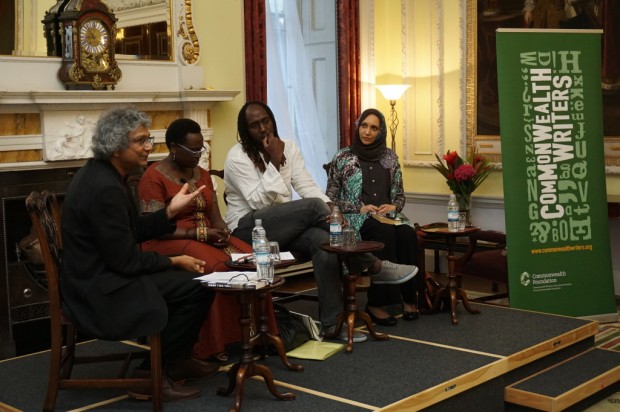You have no items in your cart. Want to get some nice things?
Go shopping
Can pain be funny? Can we laugh at terrible situations? Which readership has “the right” to laugh, and at what? And which writer the right to make them laugh?: These were some of the questions that were explored on Tuesday September 16th at the Commonwealth Foundation, in which a panel discussion of four prestigious writers across a varied range of genres and nationalities launched the 2015 Commonwealth Short Story Prize. The panel, “Commonwealth Writers Conversation: No laughing matter? Conflict and humour- is there a line?” was chaired by Romesh Gunesekera (Sri Lankan novelist) in conversation with Dr. Jennifer Nansubuga Makumbi (Ugandan novelist, short story writer and poet and winner of 2014 Commonwealth Short Story Prize), Kei Miller (Jamaican poet, novelist and essayist) and Leila Aboulela (Sudanese novelist, short story and playwright).
The panel agreed that humour arises from tension; from the onset there was a tension between the weight of the colonial past and the present. The very building in which the talk was held, with its imposing paintings of 18th-century Lords and grandiose furnishings, visualised this strain. There was also the tension of each writer negotiating different countries and cultures through words.
Jennifer and Leila spoke of the need to establish a distance from their characters in order to find the humour in them, whilst Kei argued for precisely the opposite, stating that for him it was specifically proximity that was needed in order to be funny. Of all the writers on the panel Kei was the one to most explicitly root his writing in humour, and argued for the important role it can play in making serious writing interesting. Humour, he suggested, is able to more subversively explore weighty themes of “serious heft” and gravitas because: “We can’t talk about pain in a straightforward way.” For him writing that intentionally sets out to be Serious (with a capital S) gets dangerously close to being self-indulgent. It is precisely by seeing the humour in a situation that you also see the complex nature of life. This contrast is brought out in his novel The Cartographer which charts a conversation between a cartographer and a Rastafarian man, exploring the dissonance between the scientific and the spiritual, and the blind spots of mapping. What the cartographer doesn’t see is perhaps more telling of what he does see.
This point was returned to when a question from the audience touched on the longstanding stereotype of Jamaicans being more “laid-back”. Kei dismissed this stereotype as propaganda spread by the Jamaican tourist board. Scratch beneath this façade of the apparently carefree man strumming his guitar on the beach, and you find pain and struggle. As they say in Jamaica: “Take a smile to cover the burn of a heart.”
Jennifer spoke of humour being deployed as a kind of coping technique; it allows characters to emerge as their own epic hero from a terrible situation. Humour becomes the mechanism with which to dominate a situation, again suggesting the potential for the comic to say much more about pain and suffering by not “telling it straight”. Both Jennifer and Leila described experiences of reading extracts of their writing and receiving unexpected audience reactions. In Jennifer’s case she found that the non-Ugandan British crowd didn’t laugh at situations that she had written to be comic. There is an expectation in Uganda, Jennifer said, for painful stories to also be funny stories. By contrast Leila described reading extracts of her story “The Museum” and having audiences laugh at passages that she hadn’t intentionally written to be funny. Both agreed though that humour is found when it is least expected. A bit like love, an audience member suggested, when you look for humour you don’t find it.
As Romesh reiterated throughout, being intentionally funny is difficult. For Leila writing at cross cultures she felt there were inevitable barriers of humour between cultures, nationalities and languages: “Sometimes humour just doesn’t translate.” Jennifer spoke of being acutely aware of having boundaries in humour: “A culture that is not mine is off the table for making jokes about.” Born in Uganda she didn’t feel she had the “right” to make jokes about, say, the royal family, or “anything I don’t own for fear of offence”. Leila also highlighted the fundamental power complex that lies at the heart of knowing how to be funny across different cultures and languages. For her, in order to be funny in both cultures, it requires the person to know and understand subtle cultural codes.
“Perhaps what we’re really asking is: does literature have the power to change the world?” Kei mused in response to an audience question on politics and literature. For Romesh it was clear that literature has the ability to change the way readers think, because he reasoned, we see the world depicted in books being just interesting as the world outside of books. Discussion then turned to readership and whether they write for a specific reader. Leila spoke of a globalised readership that had been enabled through the internet, and how this readership are able to transcend traditional ties of culture and ethnicity. Taking a globalised view of an ever-changing readership Leila said the imagined criteria was simply: “Whoever reads what I read is my readership.”

About Charlotte Fereday
Charlotte is a full time final year AHRC funded PhD candidate in the Spanish, Portuguese & Latin American Studies department (SPLAS) at King's College London. Her research focuses on the plays of Spanish writers who went into exile in Latin America following Spain's Civil War. She's also a part time Research Assistant working on a Hispanic theatre in translation project "Out of the Wings" (www.outofthewings.org), a platform that makes the riches of Spanish & Spanish American theatre accessible to English-speaking researchers, theatre professionals & anyone with internet access. See her research biography here: https://kcl.academia.edu/CharlotteFereday




